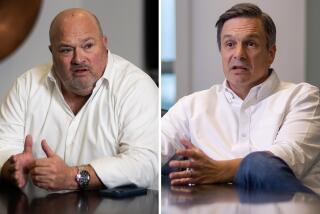Catholic Church Must Lose the Psychobabble
VATICAN CITY — Let the healing begin.
This seems to be the consensus Catholic response, ranging from victims groups to the church hierarchy to the Catholic press. It is an entirely appropriate sentiment if the question is reconciling the victims of clergy sexual abuse to the church.
But it is a hopelessly inadequate reaction if the question is fixing what is broken in the structures of Catholic belief and practice in the United States.
The jargon of the therapeutic culture in which “fixated ephebophilia” masks the reality of homosexual molestation and “observe the boundaries” replaces “don’t commit grave sin” is part of the problem, not part of the solution, to a crisis caused by priests who broke their vows and bishops who failed to lead.
Stripped of secular-therapeutic euphemisms, here is what caused most cases of clergy sexual abuse and episcopal malfeasance: Unchaste priests weakened by poor theological instruction and defective spiritual formation met confused teenagers and young men weakened by a sex-saturated culture. Then bishops who had absorbed the managerial and bureaucratic ethos of modern American institutional life reacted to the sorry results of those encounters as managers rather than apostles.
Something is manifestly wrong in the Catholic Church when psychology constantly trumps moral theology in describing what is going on when a man seduces a teenage boy. And something is manifestly wrong when the forgiveness that is possible for all repentant sinners is confused with restoring the sinner to a public trust.
Very little of the recent commentary has gotten to the sources of today’s Catholic crisis. This crisis did not come from nowhere. It is the result of a Catholic “ecology” damaged by a culture of dissent that has persistently promoted “Catholic Lite” views of core beliefs and institutions.
This culture of dissent views the priesthood as simply another form of “ministry” rather than a re-presentation of the priesthood of Christ himself. It misconstrues what it means to be a bishop -- in the Catholic understanding of things, a teacher, not a discussion-group moderator whose task is to keep everybody reasonably happy and “in the conversation.” It has contempt for the church’s sexual ethic; indeed, widespread dissent among theologians and priests from the church’s settled teaching about the nobility of sexual love within marriage helped create a situation in which some priests gave themselves passes on sexual misbehavior and some bishops failed to recognize sin for what it was.
Public relations experts may have advised the U.S. bishops that using the language of “healing” and “respecting boundaries” will help get a psychobabble-saturated media off the church’s case. That seems unlikely. Beyond tactics, however, it is a desperately wrongheaded approach to fixing the current fractures in the church, which are fractures of conviction, commitment and discipline.
Catholics believe the church’s “form” was given to it by Christ. That form includes the leadership of bishops in local churches, so there can be no Catholic reform without strong, confident bishops, unafraid to be doctrinally and morally assertive.
Where could bishops who want to be such leaders look for recent models of effective, systemic institutional reform? How about the experience of the U.S. Army after Vietnam? The Army was a shambles in 1975, which had something to do with the general cultural implosion of the 1960s. But the men who rebuilt the Army didn’t blame “the times” for their problems.
Rather, they had the courage to see that failures of leadership, institutional inertia and a breakdown of the Army’s understanding of its unique mission had created the catastrophe of the early 1970s. Having gotten the analysis right, genuine reform could follow.
So Catholic bishops, priests and laity must begin talking about the crisis in their native language, the language of sin, grace and redemption; good and evil; fidelity and infidelity. Biblical and theological language must replace psychobabble.
The real issues in the Catholic crisis that now seems certain to spill over into 2003 are, have been and will continue to be issues of fidelity and infidelity. Those issues won’t be successfully addressed until the church reclaims its own vocabulary.


